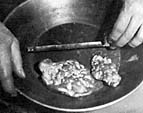Gold Districts of California
INTRODUCTION
Between 1848 and 1967, California was the source of more than 106 million troy ounces
of gold. This total was far greater than that for any other state in the Union and
represented about 35 percent of the total United States production.
Although gold was mined in California in the late 18th and early 19th Centuries, the
gold rush did not begin until after Marshall's discovery at Sutter's Mill in 1848.
Thousands of gold seekers soon arrived, and in a few years much of the state was
permanently settled. Gold production attained an all-time high of $81 million in 1852 but
then declined because of the exhaustion of the rich surface placers. At the last
government-set price of $35 per ounce, the 1852 amount would have been about $138
million.
Hydraulic mines become the largest sources of gold until curtailed by court order in
1884. Lode mines and dredges were the principal sources after that date. During the
depression years of the 1930s, gold output in the state was nearly as high as it had been
during the gold rush. Gold mining was curtailed during World War II and has not recovered
since.
 A number of spectacular nuggets and masses of pure
gold were recovered in California during the early days. The most famous were the
195-pound mass of gold from Carson Hill and the 54-pound Willard nugget from Magalia.
Small high-grade ore shoots or pockets have been found in many districts, but the richest
and most numerous have been in the Alleghany district of Sierra County. A number of spectacular nuggets and masses of pure
gold were recovered in California during the early days. The most famous were the
195-pound mass of gold from Carson Hill and the 54-pound Willard nugget from Magalia.
Small high-grade ore shoots or pockets have been found in many districts, but the richest
and most numerous have been in the Alleghany district of Sierra County.
Edited from: Gold Districts of California, by: W.B. Clark, California
Department of Conservation, Division of Mines and Geology, Bulletin 193, 1970. Image
from:L.L. Huelsdank.
Return to Gold Districts of California
|